-
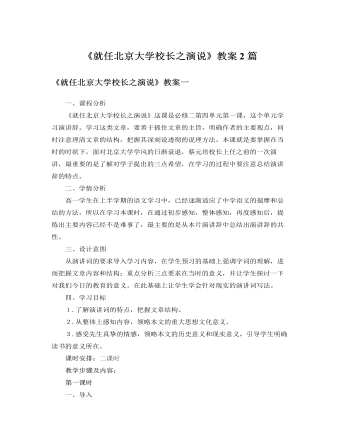
人教版高中语文必修2《就任北京大学校长之演说》教案2篇
(现状:①对于教员,不能以诚相待,礼敬有加,只是利用耳。2段:因做官心切,对于教员,则不问其学问浅深,唯问其官阶之大小。官阶大者,特别欢迎,盖唯将来毕业有人提携。②对于同学校友,不能开诚布公,道义相勖。)他的第三点要求是,要求青年学子。这是从个人涵养方面来说的。尊敬师长,团结友爱,互相勉励,共同提高,是建设良好校风必须具备的条件。端正学风,改善校风,就是为培养学术研究新风气创造条件。全校上下树立了新风尚,学校的学术气也就会很快浓起来。这也是贯彻“思想自由”的办学方针,不可或缺的措施。蔡元培先生在他这次演讲中,始终是围绕着他的办学方针来阐述的。(四)蔡先生提出两点计划,目的为何?思考、讨论、明确:一曰改良讲义,以期学有所得,能裨实用。
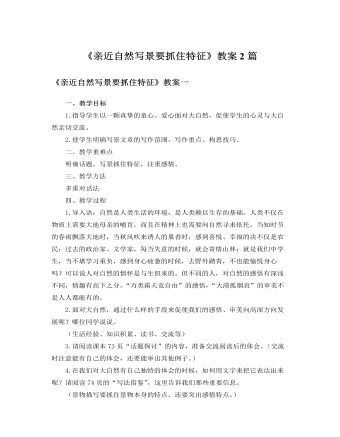
人教版高中语文必修2《亲近自然写景要抓住特征》教案2篇
一、教学目标1.指导学生以一颗真挚的童心、爱心面对大自然,促使学生的心灵与大自然亲切交流。2.使学生明确写景文章的写作范围、写作重点、构思技巧。二、教学重难点明确话题,写景抓住特征,注重感情。三、教学方法多重对话法四、教学过程1.导入语:自然是人类生活的环境,是人类赖以生存的基础。人类不仅在物质上需要大地母亲的哺育,而且在精神上也需要向自然寻求依托。当知时节的春雨飘落大地时,当秋风吹来诱人的果香时,感到喜悦、幸福的决不仅是农民;过去的政治家、文学家,每当失意的时候,就会寄情山林;就是我们中学生,当不堪学习重负,感到身心疲惫的时候,去野外踏青,不也能愉悦身心吗?可以说人对自然的情怀是与生俱来的。但不同的人,对自然的感悟有深浅不同,情趣有高下之分。“万类霜天竞自由”的感悟,“大漠孤烟直”的审美不是人人都能有的。2.面对大自然,通过什么样的手段来促使我们的感悟、审美向高深方向发展呢?哪位同学说说。
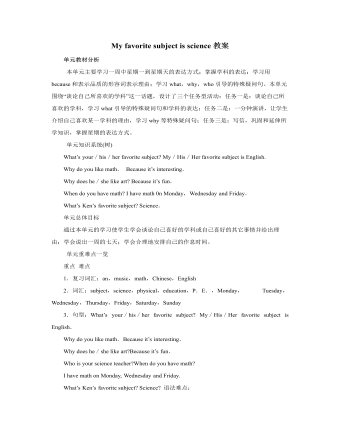
人教版新目标初中英语七年级上册My favorite subject is science教案
本单元主要学习一周中星期一到星期天的表达方式;掌握学科的表达;学习用because和表示品质的形容词表示理由;学习what,why,who引导的特殊疑问句。本单元围绕“谈论自己所喜欢的学科”这一话题,设计了三个任务型活动:任务一是:谈论自己所喜欢的学科,学习what引导的特殊疑问句和学科的表达;任务二是:一分钟演讲,让学生介绍自己喜欢某一学科的理由,学习why等特殊疑问句;任务三是:写信,巩固和延伸所学知识,掌握星期的表达方式。单元知识系统(树)What’s your/his/her favorite subject? My/His/Her favorite subject is English.Why do you like math. Because it’s interesting.Why does he/she like art? Because it’s fun.When do you have math? I have math 0n Monday,Wednesday and Friday.What’s Ken’s favorite subject? Science.单元总体目标通过本单元的学习使学生学会谈论自己喜好的学科或自己喜好的其它事情并给出理由;学会说出一周的七天;学会合理地安排自己的作息时间。

人教版新目标初中英语七年级下册How was your weekend教案2篇
Teaching Goal:1. General aims:Talk about recent past events2. Particular aims:A. Language Focus.Talk about recent past events and think of the past events.B. Language goalsHow was….?It was …What did …do over the weekend?C. Language structures:(1). How was your weekend? I was great. Pay attention to no form.(2). What did you do over the weekend? I played soccer. We went to the beach.D. Useful words and phrases:Words: was, did, went, beach, over, project, test, wasn’t, false, number, geography, spend, week, most, mixture, their, had, little, cook, read, saw, change, everyone, sit, sat, no, anythingPhrases: did one’s homework, played soccer, cleaned my room, went to the beach, played tennis, went to the movies, on Saturday morning, over the weekend, cook … for, what about, do some reading, have a party, talk show, go shoppingE. Grammar language:Present simple past tenseRegular and irregular verbsF. Learning strategies:Tour and holidaysG. Interdiscipinary:H. Emotion and manner:Teaching time: 5 periodsTeaching procedures:Period One教学步骤、时间 教师活动 学生活动 媒体应用Step 1Free talk 3’ Ask some questions like:Who’s on duty today?What’s the weather like? Answer and talk about something.让同学们回答下列问题1. Do you like weekend? (Let some students answer)It takes them three minutes to talk about the question.2. Why do you like weekend? (let the students answer) Most of the students like the weekend此时教师用汉语问:“在周末期间问你干了什么?这句话用英语这么回答?Let the students guess.At last the teacher give them right answer3. What did you do over the weekend?(板书、学习)

人教版新目标初中英语七年级下册Where is the post office教案2篇
Period 2 (3a----Section B 2c)Preview(Pre-task): Key points: What laAdd another information about their pen pals----their language on the cardnguage does she/he speak?She/He speaks....Does she/he have any brothers and sisters? Does she/he speak English?Preview(Pre-task): Add another information about their pen pals----their language on the cardKey points: What language does she/he speak?She/He speaks....Does she/he have any brothers and sisters? Does she/he speak English?Step 1 Revision1.Revisionand dictation of the new words 2.Revise the drills they learned yesterday.(by pairwork and grammar exercise)Step 2 Leading-inT has a conversation with one student. The conversation is following:---Do you have a pen pal?---Yes, I do.---What's your pen pal's name? ---His/Her name is....---Where is your pen pal from? ---He/She is from...---Where does he/she live? ---He/She lives in....---What language does he/she speak?He/She speaks...Write the new words on the Bb. They are following: EnglishChineseJapaneseFrenchStep 3 LearnLearn the new words with the whole class.Finish 3a with the students3b Pairwork T still does an example with one student Then the Ss practise in pairs. The example is following:--Curry Muray is my pen pal. He is from the United States.---What language does he speak?
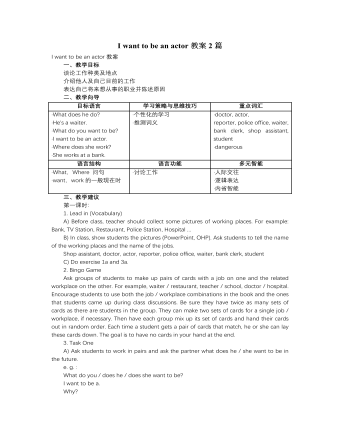
人教版新目标初中英语七年级下册I want to be an actor教案2篇
三、教学建议第一课时:1. Lead in (Vocabulary)A) Before class, teacher should collect some pictures of working places. For example: Bank, TV Station, Restaurant, Police Station, Hospital ...B) In class, show students the pictures (PowerPoint, OHP). Ask students to tell the name of the working places and the name of the jobs.Shop assistant, doctor, actor, reporter, police office, waiter, bank clerk, studentC) Do exercise 1a and 3a.2. Bingo GameAsk groups of students to make up pairs of cards with a job on one and the related workplace on the other. For example, waiter / restaurant, teacher / school, doctor / hospital. Encourage students to use both the job / workplace combinations in the book and the ones that students came up during class discussions. Be sure they have twice as many sets of cards as there are students in the group. They can make two sets of cards for a single job / workplace, if necessary. Then have each group mix up its set of cards and hand their cards out in random order. Each time a student gets a pair of cards that match, he or she can lay these cards down. The goal is to have no cards in your hand at the end.3. Task OneA) Ask students to work in pairs and ask the partner what does he / she want to be in the future.e. g. :What do you / does he / does she want to be?I want to be a.Why?Because it's (adj).B) Vocabulary: Section B, 1a4. Homework 1.2.
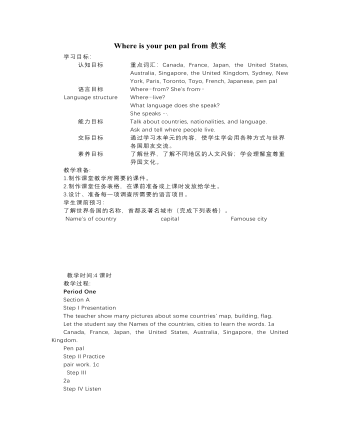
人教版新目标初中英语七年级下册Where is your pen pal from教案
2.1Match the country with the language.Step II Reading3a? let the students read the letter fast and answer the questions.? Let the students ask more questions about the letter as possible as the can.Step III Writing3b.Step IV. Pairwork2cStep V Listening2a, 2bStep V. HomeworkExercises book(1) P3Exercises book (2) P3Period FourStep I . Dictate the words and sentences in Unit1.Step II. Self-checkStep III. Check the answers for Exercises book in the unit.Step IV. Home workRevise and preparation for unit 2.教学反思:通过本单元的学习,学生基本可以谈论人们的国籍,居住城市及其所说的语言,通过书信方式去介绍自己并寻找笔友。但在涉及到国外的一些城市时,学生对这方面的知识相对欠缺,能介绍的城市并不多,也反应出学生课前预习不充分,这跟学生学习条件也有关,大多数学生无法通过网络获取所需信息。因此,在以后的教学中要多指导学生通过计算机网络获取信息,拓宽知识面。
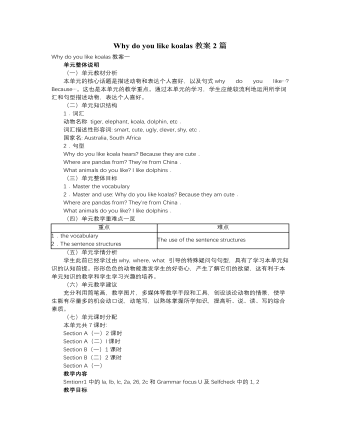
人教版新目标初中英语七年级下册Why do you like koalas教案2篇
单元整体说明(一)单元教材分析本单元的核心话题是描述动物和表达个人喜好,以及句式why do you like…? Because…。这也是本单元的教学重点。通过本单元的学习,学生应能较流利地运用所学词汇和句型描述动物,表达个人喜好。(二)单元知识结构1.词汇动物名称 tiger, elephant, koala, dolphin, etc.词汇描述性形容词: smart, cute, ugly, clever, shy, etc.国家名: Australia, South Africa2.句型Why do you like koala hears? Because they are cute.Where are pandas from? They're from China.What animals do you like? I like dolphins.(三)单元整体目标1.Master the vocabulary2.Master and use: Why do you like koalas? Because they am cute.Where are pandas from? They're from China.What animals do you like? I like dolphins.(四)单元教学重难点一览(五)单元学情分析学生此前已经学过由why, where, what 引导的特殊疑问句句型,具有了学习本单元知识的认知前提。形形色色的动物能激发学生的好奇心,产生了解它们的欲望,这有利于本单元知识的教学和学生学习兴趣的培养。
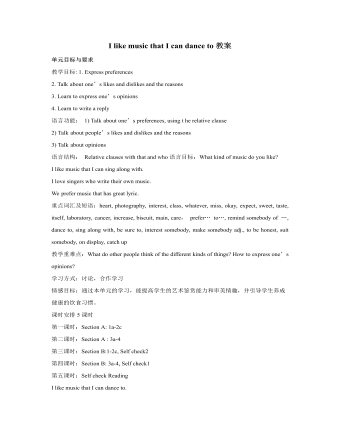
人教版新目标初中英语九年级上册I like music that I can dance to教案
教学目标: 1. Express preferences2. Talk about one’s likes and dislikes and the reasons3. Learn to express one’s opinions 4. Learn to write a reply 语言功能: 1) Talk about one’s preferences, using t he relative clause2) Talk about people’s likes and dislikes and the reasons3) Talk about opinions语言结构: Relative clauses with that and who语言目标:What kind of music do you like?I like music that I can sing along with.I love singers who write their own music.We prefer music that has great lyric.重点词汇及短语:heart, photography, interest, class, whatever, miss, okay, expect, sweet, taste, itself, laboratory, cancer, increase, biscuit, main, care, prefer… to…, remind somebody of …, dance to, sing along with, be sure to, interest somebody, make somebody adj., to be honest, suit somebody, on display, catch up教学重难点:What do other people think of the different kinds of things? How to express one’s opinions? 学习方式:讨论,合作学习情感目标:通过本单元的学习,能提高学生的艺术鉴赏能力和审美情趣,并引导学生养成健康的饮食习惯。课时安排5课时第一课时:Section A: 1a-2c第二课时:Section A : 3a-4第三课时:Section B:1-2c, Self check2第四课时:Section B: 3a-4, Self check1第五课时:Self check ReadingI like music that I can dance to.

人教版新目标初中英语九年级下册By the time I got outside, the bus had already left教案
Ⅰ. Teaching Aims and Demands1. Knowledge Objects(1) Key Vocabularyoversleep(2) Target LanguageWhat happened?I overslept. And by the time I got up, my brother had already gotten in the shower.2. Ability Objects(1) Teach the students to use the new words.(2) Train the students to narrate past events with the Past Perfect Tense.(3) Train the students' listening and speaking skills with the target language.3. Moral ObjectIt’s a good habit to go to bed early in the evening and get up early in the morning. So you’ll never be in a hurry in the morning.Ⅱ. Teaching Key Points1. Key Vocabularyoversleep2. Target LanguageNarrate past events with the Past Perfect TenseⅢ. Teaching Difficult Points1. Train the students to narrate past events with the Past Perfect Tense.2. Train the students to understand the target language in spoken conversation.Ⅳ. Teaching Methods1. Thinking of examples from the students' real lives.2. Making sentences by looking at the pictures.Ⅴ. Teaching AidA tape recorderⅥ. Teaching ProceduresStep I Revision1. Revise the language points in Unit 8.Ask some questions like this: What volunteer work would you like to do?Help the students to answer, I’d like to…/I love to…/I hope to2. Practice the dialogue in Activity 3c on page 62 again. Get students to role play the similar dialogues with the following.

人教版新目标初中英语九年级上册Where would you like to visit教案2篇
The First PeriodⅠ.Teaching Aims and DemandsKnowledge Objects(1) Key Vocabularytiring, educational, fascinating, thrilling, peaceful, exotic, trek, jungle, take it easy, explore, historic, site(2) Target LanguageWhere would you like to go on vacation?I’d like to trek through the jungle, because I like exciting vacations.2. Ability Objects(1)Train students to talk about places they would like to visit with the target language.(2)Train students to describe vacations with different adjectives.(3)Train students' listening skill.3. Moral Object,It′s more interesting to go on vacating somewhere instead of staying at home.Ⅱ. Teaching Key Points1. Key Vocabularytiring, educational, fascinating, thrilling, peaceful, exotic, trek, jungle, take it easy, explore, historic, site2. Target LanguageTalk about different places with the target language.Ⅲ. Teaching Difficult Points1. Describe vacations with different adjectives.2. Talk about different places with the target language.Ⅳ. Teaching Methods1. Teaching by illumination2. Teaching by doing chain drills3. Teaching by pairworkⅤ. Teaching Aids1. A tape recorder2. Some pictures of different places with famous views

人教版新目标初中英语九年级下册Rainy days make me sad教案
1. 教材分析本单元以how do things affect you?为话题, 从颜色、天气、音乐、广告、产品等方面谈论了外界事物如何影响人的心情。要求学生掌握表达某物或某事给人带来的感觉、看法或影响等。共设计了四个部分的内容:Section A 该部分有4个模块:第一模块围绕Which restaurant would you like to go to?这一话题展开思维(1a)、听力(1b)、口语(1c)训练;第二模块围绕How does music affect you? 进行听力(2a-2b)、口语训练(2c);第三模块继续围绕how do colors in the restaurant affect you这一话题展开训练,训练形式为阅读和问题体验(3a)和小组活动(3b);第四模块仍就How do things affect you这一话题以调查的形式展开讨论。Section B该部分有4个模块:第一模块围绕产品广告对人们的影响这一话题以“配对”(1a)与“列举”(1b)两种形式展开训练;第二模块继续围绕How do things affect you? 进行听力(2a-2b)、口语对话训练(2c);第三模块围绕“Advertising”这一话题展开阅读(3a-3b)和写作(3c)训练;第四模块围绕How posters affect you这一话题以口语训练形式展开小组活动。

人教版新目标初中英语九年级下册I’ll help clean up the city parks教案
Talk about offering help (P60)I’ll help clean up the city parks.A: I’d like to work ...B: You could help ...Talk about ways to tell people about the Clean-Up Day (P61)We need to ...We can’t ...I’ll ...Talk about the work the volunteers do (P62)These three students all volunteer their time to help other people.Somebody loves to ... / helps ... / plans to ... / wants to ...A: What do you like doing?B: I like ... A: What kind of volunteer work do you think I could do?B: You could ...1. 重点词汇advertisement, fix, repair, pleasure, blind, deaf, shut, carry, specially, fetch2. 认读词汇hunger, homeless, cheer, clean-up, sign, establish, major, commitment, elementary, veterinarian, coach, similar, call-in, strategy, disabled, organization, unable, support, appreciate, donation, part of speech, pronoun, adverb, preposition, conjunction, donate, Jimmy, Sally3. 词组clean up, cheer up, give out, put off, set up, think up, take after, fix up, give away, put up, hand out, work out, at once

人教版高中历史必修2第二次工业革命教案2篇
请回答:根据上述材料,概述第二次工业革命兴起的主要原因。〖参考答案〗①政治上,资本主义制度在世界范围内的确立,为第二次工业革命提供了政权保障。②市场上,世界市场进一步拓展,推动生产进步发展。③科技上,19世纪自然科学的飞速发展与重大突破。④劳动力上,拥有更多、素质更好的自由劳动力。⑤经济上,拥有更加雄厚的资本。探索攻关二:第二次工业革命与垄断组织的出现的关系材料一第二次工业革命产生的新兴工业部门,在厂房、设备、技术要求和产品结构的复杂性等方面,都对生产组织提出了新的要求。这是过去的独家企业无法满足的,而且一般没有足够的资金。……于是,集中资金的合股公司迅速增加起来,起大型企业垄断组织也就应运而生。
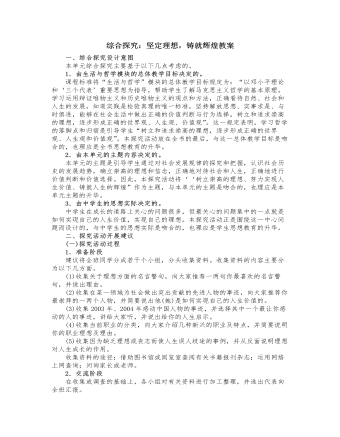
人教版高中政治必修4综合探究:坚定理想,铸就辉煌教案
理想扎根在实践的土壤中理想当然是重要的,但是不能把理想当成幻想或空想,理想必须扎根在实践的土壤中。青年人充满激情,这是非常重要的。古人有句话:“哀莫大于心死”。最大的悲哀就是没有追求,就像一团火焰熄灭了一样,即使到了我这个年纪也不能“哀莫大于心死”。青年人都有很高的激情,这是很好的。但是青年的激情往往不大稳定,过去人们说青年人的热情是“三分钟的热度”。这句话不一定准确,但青年人在这一点上应该有一个正确的认识。记得我大学毕业时,对于走向社会、走向生活充满了幻想,认为生活中的一切都是美好的,是典型的理想主义者,因此,对自己不能正确的估价,好高骛远,只愿做大事,不愿也不注意从小事积累。列宁说过,大事是由小事积累而成的。我当初毕业时,一方面充满了激情,另一方面也确实过高地估计了自己。
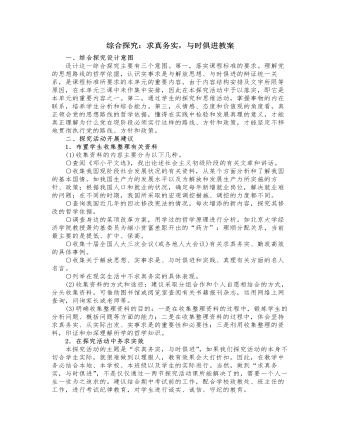
人教版高中政治必修4综合探究:求真务实,与时俱进教案
7.我国人力资源开发利用面临四大挑战在全面建设小康社会进程中,我国人力资源开发与利用面临着以下四个方面严峻挑战。(1)劳动力供给高峰的到来加剧了劳动力供求总量矛盾。持续的经济增长和人口计划生育控制,使得我国人口再生产在不到30年的时间内完成了从“高出生率、低死亡率、高自然增长率”的类型到“低出生率、低死亡率、低自然增长率”类型的转变,人口在日增长率已经连续数年低于千分之十。然而,庞大的人口基数及其低速增长仍对中国未来经济增长和社会发展带来巨大的就业压力,大量预测表明,未来20年是中国人口数量增长和劳动力供给的高峰时期。20世纪90年代以来,中国劳动年龄人口比重(16—59岁年龄组)由1990—1996年期间的61%~62%上升到1999年的63.2%。这种趋势将会持续到2020年左右达到峰值,直到老龄化进程抵消了数量增长效应,劳动年龄人口的比重才会趋于下降。到2020年,中国劳动年龄人口将由2000年的8.61亿上升到10.04亿,平均每年新增劳动力715万人。
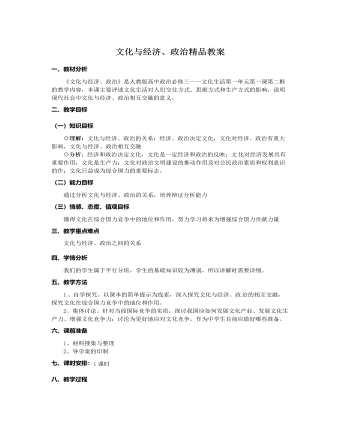
人教版高中政治必修3文化与经济、政治精品教案
一、教材分析《文化与经济、政治》是人教版高中政治必修三——文化生活第一单元第一课第二框的教学内容,本课主要评述文化生活对人们交往方式、思维方式和生产方式的影响,说明现代社会中文化与经济、政治相互交融的意义。二、教学目标(一)知识目标◇理解:文化与经济、政治的关系:经济、政治决定文化,文化对经济、政治有重大影响,文化与经济、政治相互交融 ◇分析:经济和政治决定文化,文化是一定经济和政治的反映;文 化对经济发展具有重要作用,文化是生产力;文化对政治文明建设的推动作用及对公民政治素质和权利意识的作;文化日益成为综合国力的重要标志。(二)能力目标通过分析文化与经济、政治的关系,培养辩证分析能力(三)情感、态度、值观目标懂得文化在综合国力竞争中的地位和作用,努力学习将来为增强综合国力贡献力量

人教版高中地理选修2西南区交通运输建设与区域经济发展教案
1、图9.6“南昆铁路示意图”掌握南昆铁路起止点、支线、途经地区、铁路线附近的矿产资源(云南的磷矿、贵州的煤矿、广西的铝矿等);南昆铁路使西南区南连北海、防城港、湛江、钦州等港,成为西南区通往沿海地区最便捷的出海通道,使西南地区物资出海路程缩短了600千米,对西南区的发展具有十分重要的经济、政治、战略意义。2、图9.10“西南三省一市和广西主要铁路分布图”本图展现了西南三省一市和广西的主要铁路分布,要求重点掌握本区内的环状铁路——成渝-川黔-贵昆-成昆线,新建的南昆线、内昆线,以及宝成线(联系西北区),襄渝线、湘黔线和湘桂-黔桂线(联系中南区),枝柳线(联系中南区和华北区)等区际铁路,昆河线等国际铁路及重要铁路枢纽。3、图9.11“西藏自治区交通图”西藏自治区是我国目前唯一没有正式通铁路的省级行政区,读图后要能掌握联系拉萨的四大入藏(川藏、青藏、新藏、滇藏)公路及正在建设的青藏铁路。
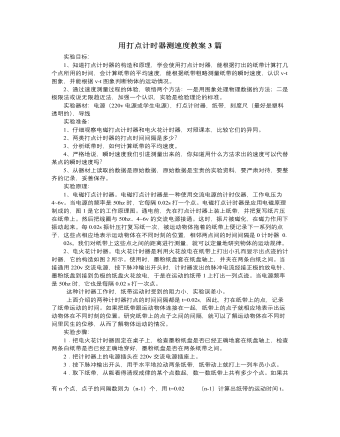
人教版新课标高中物理必修1用打点计时器测速度教案3篇
实验目标:1、知道打点计时器的构造和原理,学会使用打点计时器,能根据打出的纸带计算打几个点所用的时间,会计算纸带的平均速度,能根据纸带粗略测量纸带的瞬时速度,认识v-t图象,并能根据v-t图象判断物体的运动情况。2、通过速度测量过程的体验,领悟两个方法:一是用图象处理物理数据的方法;二是极限法或说无限趋近法,加强一个认识,实验是检验理论的标准。实验器材:电源(220v电源或学生电源),打点计时器,纸带,刻度尺(最好是塑料透明的),导线实验准备:1、仔细观察电磁打点计时器和电火花计时器,对照课本,比较它们的异同。2、两类打点计时器的打点时间间隔是多少?3、分析纸带时,如何计算纸带的平均速度。4、严格地说,瞬时速度我们引进测量出来的,你知道用什么方法求出的速度可以代替某点的瞬时速度吗?
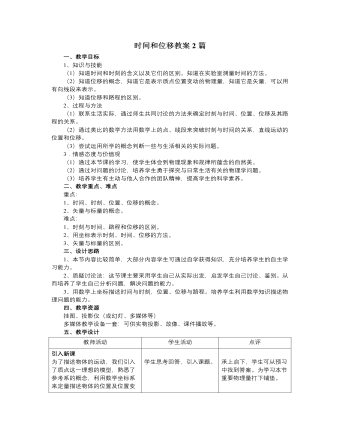
人教版新课标高中物理必修1时间和位移教案2篇
2、过程与方法(1)联系生活实际,通过师生共同讨论的方法来确定时刻与时间、位置、位移及其路程的关系。(2)通过类比的数学方法用数学上的点、线段来突破时刻与时间的关系,直线运动的位置和位移。(3)尝试运用所学的概念判断一些与生活相关的实际问题。3.情感态度与价值观(1)通过本节课的学习,使学生体会到物理现象和规律所蕴含的自然美。(2)通过对问题的讨论,培养学生勇于探究与日常生活有关的物理学问题。(3)培养学生有主动与他人合作的团队精神,提高学生的科学素养。二、教学重点、难点重点:1、时间、时刻、位置、位移的概念。2、矢量与标量的概念。难点:1、时刻与时间、路程和位移的区别。2、用坐标表示时刻、时间、位移的方法。3、矢量与标量的区别。